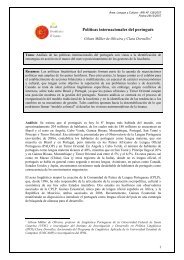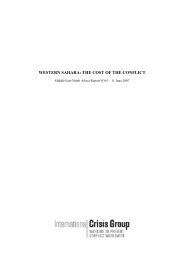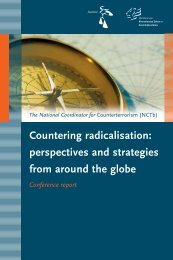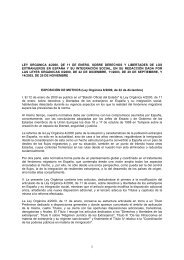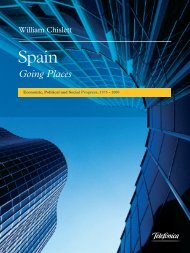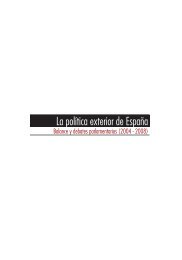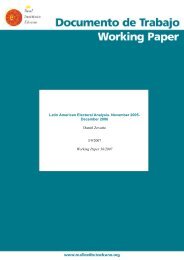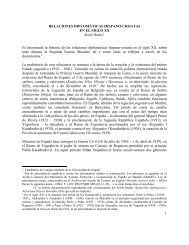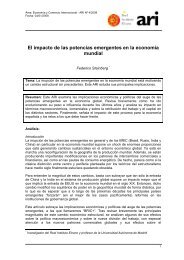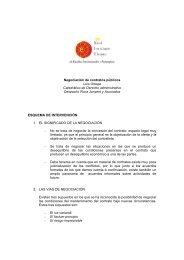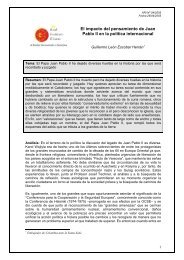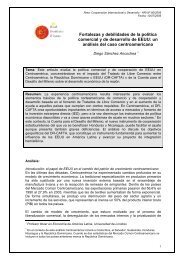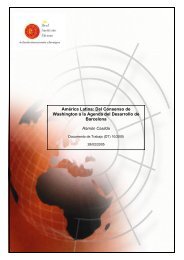Spain and the United States - Real Instituto Elcano
Spain and the United States - Real Instituto Elcano
Spain and the United States - Real Instituto Elcano
Create successful ePaper yourself
Turn your PDF publications into a flip-book with our unique Google optimized e-Paper software.
OVERVIEW 31<br />
forces were not happy at <strong>the</strong> democratic direction in which <strong>the</strong> country was<br />
moving, <strong>and</strong> on February 23, 1981 members of <strong>the</strong> Civil Guard, headed by Lt.<br />
Col. Antonio Tejero, stormed <strong>the</strong> Spanish parliament as part of a failed coup.<br />
Instead of rallying to <strong>the</strong> support of <strong>the</strong> beleaguered government, <strong>the</strong> US<br />
Secretary of State, Alex<strong>and</strong>er Haig, a former general, said <strong>the</strong> coup was “a<br />
Spanish internal affair.” This unfortunate remark confirmed <strong>the</strong> belief of <strong>the</strong><br />
Spanish left, <strong>and</strong> democrats as a whole, that <strong>the</strong> US government placed little<br />
importance on <strong>the</strong> fate of Spanish democracy <strong>and</strong> that it still hankered after <strong>the</strong><br />
cosy relationship it had during <strong>the</strong> Franco regime. The left was also<br />
antagonised by <strong>the</strong> heavy-h<strong>and</strong>ed US intervention in Central America during<br />
<strong>the</strong> early 1980s, following <strong>the</strong> S<strong>and</strong>inista revolution in Nicaragua. The centrist<br />
government of Leopoldo Calvo Sotelo pressed ahead, <strong>and</strong> in May 1982 <strong>Spain</strong><br />
entered NATO. The October general election, however, was overwhelmingly<br />
won by <strong>the</strong> Socialists, who were against NATO membership <strong>and</strong> committed to<br />
submitting <strong>the</strong> issue to a referendum.<br />
8. The watershed 1988 bases agreement<br />
The Socialists, in a policy U-turn, campaigned, to <strong>the</strong> great relief of <strong>the</strong> US<br />
government, for a “yes” vote in <strong>the</strong> 1986 referendum on NATO membership<br />
(<strong>the</strong>ir campaign slogan was “In <strong>the</strong> interest of <strong>Spain</strong>”) <strong>and</strong> <strong>the</strong>y won <strong>the</strong> day<br />
(52.5% in favour <strong>and</strong> 39.8% against). But <strong>the</strong>y attached three conditions to <strong>the</strong><br />
irritation of Washington: <strong>Spain</strong> would not join NATO’s integrated military<br />
structure; <strong>the</strong> ban on nuclear weapons in <strong>Spain</strong> would remain <strong>and</strong>, most<br />
importantly, <strong>the</strong>re would be a gradual reduction of <strong>the</strong> US military presence in<br />
<strong>Spain</strong> including <strong>the</strong> F-16 jet fighters. For <strong>the</strong> Socialists, overcoming <strong>the</strong><br />
Francoist origin of <strong>the</strong> bilateral agreement would only be achieved by reducing<br />
<strong>the</strong> US presence <strong>and</strong> not just by joining NATO. What Kissinger had feared in<br />
1970 <strong>and</strong> 1974 would now come to pass.<br />
Prime Minister Felipe González set <strong>the</strong> tone for <strong>the</strong> negotiations in a<br />
seminal speech in Washington in September 1985: “We should not be surprised<br />
that those defeated in <strong>the</strong> Civil War <strong>and</strong> <strong>the</strong> democratic opposition in general<br />
should have viewed <strong>the</strong> treaties as American support for <strong>the</strong> dictatorship <strong>and</strong> a<br />
blow for <strong>the</strong> hopes of a rapid democratic restoration in <strong>Spain</strong>.” The Socialists,<br />
emboldened by NATO membership <strong>and</strong> entry into <strong>the</strong> European Community,<br />
which made <strong>Spain</strong> a much more attractive country for <strong>the</strong> <strong>United</strong> <strong>States</strong> as it<br />
consolidated <strong>Spain</strong>’s market economy <strong>and</strong> democracy, took a tough position in<br />
<strong>the</strong> arduous 1986-88 round of negotiations. They pressed for a much more<br />
balanced relationship <strong>and</strong> made it clear from <strong>the</strong> outset that if no agreement<br />
was reached by <strong>the</strong> time <strong>the</strong> accord expired in May 1988 <strong>the</strong> <strong>United</strong> <strong>States</strong>



